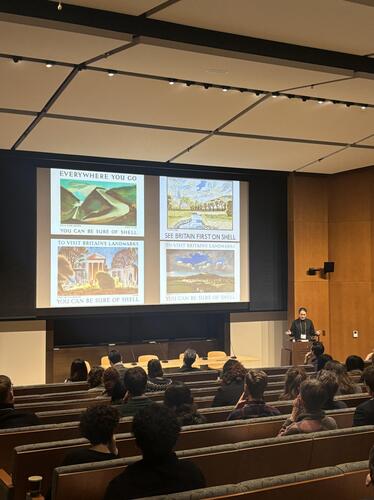
The Yale Environmental History group hosted its “New Perspectives in Energy History” Conference on March 2nd, inviting energy scholars from institutions across the northeast region to reflect on some of the field’s current work and future progress.
As the first in-person conference since its 2020 gathering was canceled due to Covid-19, the day-long event included three faculty-moderated panels that each showcased work from graduate and postdoctoral researchers and followed with comments and Q&A opportunities. The conference closed with a faculty roundtable discussion that looked ahead to new directions in energy history research.
“It was thrilling to see the many new directions in which energy humanities research has developed in such a short time,” Yale anthropology professor Douglas Rogers wrote. “The presentations by current PhD students from around the northeast were a real highlight for me, and they demonstrate the vibrancy of this field of inquiry.”
Featured projects—ranging from the history of oil refining centers in the Caribbean to rural electrification in Cold War-era North Korea—grappled with the complex cultural, political, and socioeconomic dimensions of energy’s infrastructure, distribution, and supply processes. Conference panels were organized in three themes: “cultures of energy”; “energy and nation”; and “geographies of energy.”
One of the conference’s thematic throughlines included the relationship among environmental concerns, energy, and the state. Talks such as Natalia Laas’ “Waste and Citizenship in the Late Soviet Union” traced the rise of environmental citizenship in the wake of the Chernobyl nuclear disaster and excess production, during which new understandings of rights empowered citizen groups to pursue compensation for ecological disaster.
Other projects also identified gender issues with changes in energy. Julia Mead’s talk, “Godspeed Comrade: Czechoslovak Coal Miners Face the Market, 1989-1994,” showed how the Czech privatization of former state coal mines introduced new understandings of masculinity by displacing millions of male miners.
Members of the faculty panel acknowledged that the discipline had begun embracing a more expansive approach to energy. In a field long associated with energy production, they noted the broadening of recent scholarship to encompass other processes such as oil-refining, distribution and consumption. According to Ian Miller, Harvard energy history professor and panelist, the scope of energy history research has broadened with increasing perspectives.
“Our field has begun to go global,” said Miller. “It is no longer a scholar in the US […] or the UK that necessarily must sit at the origin of our historiographies.”
Reflecting on the event, the faculty panel also noted a need to increase consideration of gender as a factor in energy history and to critically assess our energy dependence as global warming accelerates. One of the energy industry’s prime paradoxes, explained University of Chicago history professor and panelist Liz Chatterjee, is its ability to accelerate movement while creating fixed infrastructures and institutions.
“The conference was a wonderful experience overall - I learned so much and I met scholars whose work I admire,” Genevieve Kane wrote.
Kane, whose project focused on the development of Boston’s waterfront, investigated the role of gas companies in shaping the area throughout the 19th and early 20th-centuries.
The submission window for conference papers opened last fall.
“More than a large audience, the level of attendance also shows that this field is growing,” Mikhail Moosa, history PhD candidate and event organizer, wrote. “We had grad students from Boston, New York, Chicago, and Toronto present, which shows that universities and colleges in these major cities have students who are interested in energy history.”
The conference was made possible by funding from the Whitney and Betty MacMillan Center for International and Area Studies at Yale; Edward J. and Dorothy Clarke Kempf Memorial Fund; and Yale Planetary Solutions Project.